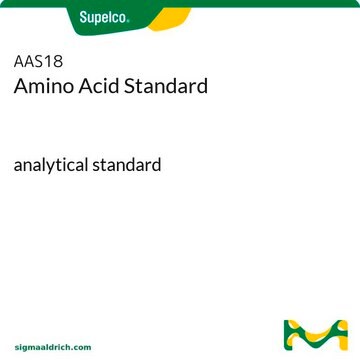47133
β-Sitosterol
certified reference material, 100 μg/mL in chloroform
Synonym(s):
α-Dihydrofucosterol, 22,23-Dihydrostigmasterol, 24α-Ethylcholesterol, 5-Stigmasten-3β-ol
About This Item
Recommended Products
grade
certified reference material
TraceCERT®
Quality Level
product line
TraceCERT®
form
liquid
CofA
current certificate can be downloaded
packaging
ampule of 1 mL
concentration
100 μg/mL in chloroform
technique(s)
HPLC: suitable
gas chromatography (GC): suitable
mp
136-140 °C (lit.)
application(s)
food and beverages
format
single component solution
functional group
hydroxyl
storage temp.
-10 to -25°C
SMILES string
O[C@H](C1)CC[C@@]2(C)C1=CC[C@]3([H])[C@]2([H])CC[C@@]4(C)[C@@]3([H])CC[C@]4([H])[C@H](C)CC[C@H](C(C)C)CC
InChI
1S/C29H50O/c1-7-21(19(2)3)9-8-20(4)25-12-13-26-24-11-10-22-18-23(30)14-16-28(22,5)27(24)15-17-29(25,26)6/h10,19-21,23-27,30H,7-9,11-18H2,1-6H3/t20-,21-,23+,24+,25-,26+,27+,28+,29-/m1/s1
InChI key
KZJWDPNRJALLNS-VJSFXXLFSA-N
Looking for similar products? Visit Product Comparison Guide
Related Categories
Application
Other Notes
Legal Information
Not finding the right product?
Try our Product Selector Tool.
Signal Word
Danger
Hazard Statements
Precautionary Statements
Hazard Classifications
Acute Tox. 3 Inhalation - Acute Tox. 4 Oral - Aquatic Chronic 3 - Carc. 2 - Eye Irrit. 2 - Repr. 2 - Skin Irrit. 2 - STOT RE 1 - STOT SE 3
Target Organs
Central nervous system, Liver,Kidney
Storage Class Code
6.1C - Combustible acute toxic Cat.3 / toxic compounds or compounds which causing chronic effects
WGK
WGK 3
Flash Point(F)
Not applicable
Flash Point(C)
Not applicable
Choose from one of the most recent versions:
Already Own This Product?
Find documentation for the products that you have recently purchased in the Document Library.
Customers Also Viewed
Protocols
Separation of Cholesterol; Brassicasterol; Campesterol; Stigmasterol; β-Sitosterol
Our team of scientists has experience in all areas of research including Life Science, Material Science, Chemical Synthesis, Chromatography, Analytical and many others.
Contact Technical Service






